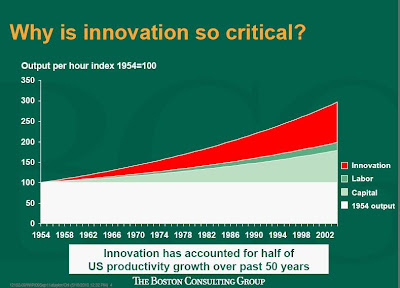 Yesterday, we started sharing some of the themes captured by your New Voices bloggers at the AAAS Science & Technology Policy Forum. Today we continue by sharing our notes from two of Friday's sessions.
Yesterday, we started sharing some of the themes captured by your New Voices bloggers at the AAAS Science & Technology Policy Forum. Today we continue by sharing our notes from two of Friday's sessions.Also - be sure to check out the New Voices Twitter feed for direct quotes from the speakers.
Strengthening the U.S. Climate for Innovation
- Innovation is using new knowledge to generate payback.
- Innovation has accounted for half of U.S. productivity growth over the pat 50 years (see slide above, courtesy of Andrew Taylor of The Boston Consulting Group).
- Increased direct government spending yields results.
- Excellence in science and technology is not enough to be a world leader.
- We need to remove barriers and encourage creativity.
- We need new kinds of scientists and engineers with: communication skills, multicultural understanding, foreign languages, and training in psychology and the creative arts
- What can the U.S. do?
- Promote science & technology education
- Increase innovation spending
- Promote industry clusters & centers of excellence
- Remove bureaucratic barriers
- Promote intellectual property protections
- Cyber security is uncharted territory; there are no rules of war.
- There is a relationship between higher education and intelligence communities. One mechanism for collaboration is the NSHEAB - National Security Higher Education Advisory Board which works with federal intelligence community.

I'm not sure I agree with #5 - Promote intellectual property protections. Science advances much more quickly with free access to ideas and data. To remain competitive we need to make efficient progress, and re-inventing the wheel every time someone approaches a similar question is not efficient. For example, our advances in alternative energy have been greatly slowed by patents and protections compared to other areas of research.
ReplyDelete